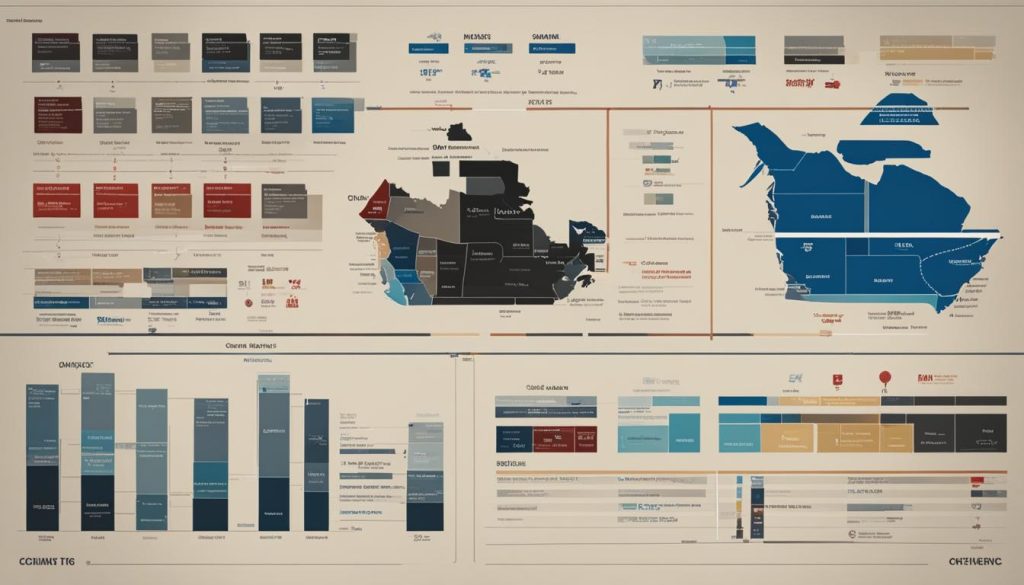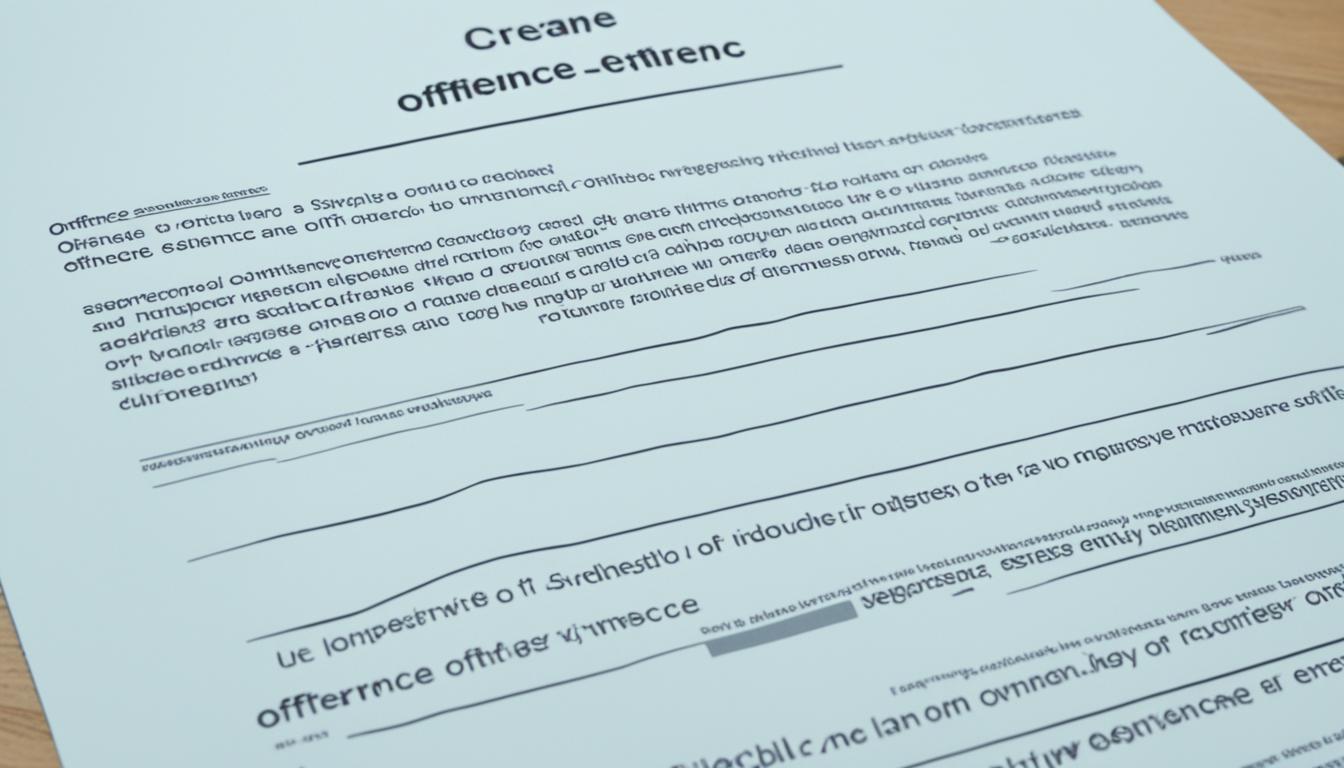Understanding Canada’s Felony Equivalents
Did you know that in Canada, crimes are not classified as felonies or misdemeanors? In fact, the Canadian legal system takes a different approach when categorizing offenses, which may come as a surprise to many.
Unlike the United States, Canada classifies crimes as indictable, hybrid, or summary offenses. Each category carries different implications and penalties, making it essential to understand how the Canadian legal system operates.
So, how does the Canadian criminal law system differ from what we are familiar with? Let’s delve into the details and explore the classifications and implications of offenses under Canadian law.
Key Takeaways:
- Canada does not have the classifications of felonies and misdemeanors like in the United States.
- Crimes in Canada are categorized as indictable, hybrid, or summary offenses.
- Indictable offenses include serious crimes like murder, manslaughter, robbery, and drug trafficking.
- Summary offenses are less serious crimes, while hybrid offenses can be prosecuted either summarily or by indictment.
- Understanding the equivalency of foreign convictions in Canada is crucial to determine immigration and travel implications.
Offense Classifications in Canada
In Canada, the Canadian legal system classifies criminal offenses into three categories: indictable offenses, hybrid offenses, and summary offenses. Understanding these classifications is essential to navigating the Canadian legal system and comprehending the consequences of criminal charges.
Indictable offenses are the most serious crimes under Canadian law. They include offenses such as murder, manslaughter, and robbery. Convictions for these offenses can lead to significant penalties, including lengthy prison sentences.
Hybrid offenses, also known as dual procedure offenses, can be prosecuted either summarily or by indictment, depending on the severity of the crime and the discretion of the Crown. Many hybrid offenses carry a maximum sentence of 18 months. Still, some are categorized as “super-summary” offenses, allowing for summary prosecution but with a higher maximum penalty.
Summary offenses are less serious crimes and generally carry less severe penalties compared to indictable offenses and hybrid offenses. These offenses are typically heard in provincial courts and are punishable by a maximum sentence of six months in jail.
It’s important to consult a qualified Canadian immigration lawyer if you are facing criminal charges in Canada or if you have been convicted of a crime in a foreign country and need to determine the equivalency of the offense under Canadian law. A lawyer can provide guidance on the legal implications and potential immigration consequences of specific criminal offenses or convictions.

| Offense Classification | Description |
|---|---|
| Indictable Offenses | The most serious crimes under Canadian law, including murder, manslaughter, and robbery. Carry significant penalties, including lengthy prison sentences. |
| Hybrid Offenses | Offenses that can be prosecuted either summarily or by indictment, depending on the severity of the crime and the discretion of the Crown. Many hybrid offenses carry a maximum sentence of 18 months. |
| Summary Offenses | Less serious crimes heard in provincial courts. Punishable by a maximum sentence of six months in jail. |
Immigration Consequences of Serious Criminality
If you have been convicted of a crime that would be considered an indictable offense in Canada, you may face immigration consequences and be deemed criminally inadmissible to enter the country. The Immigration and Refugee Protection Act (IRPA) defines serious criminality as an offense that carries a minimum punishment of 10 years’ imprisonment in Canada. While the terminology used in a foreign conviction may differ from Canadian law, it is crucial to evaluate the essential elements of the offense to determine its equivalency under Canadian standards of criminal law.
Understanding the potential consequences and navigating the complexities of admissibility to Canada requires the expertise of an immigration lawyer. They can assess the similarities and differences between a foreign conviction and Canadian offenses, providing guidance on how it may impact your ability to enter the country.
Equivalency Analysis: Aligning Foreign Convictions with Canadian Offenses
An equivalency analysis involves a detailed examination of the wording and essential elements of a foreign statute in comparison to Canadian offenses. Although the exact phrasing may vary, there needs to be a substantial overlap between the two offenses in terms of their essential ingredients. This analysis is critical for determining the potential immigration consequences of a foreign conviction and whether it falls under the definition of serious criminality in Canada.
By consulting with an immigration lawyer experienced in Canadian criminal law, you can gain a comprehensive understanding of the equivalency assessment and its potential implications for admissibility to Canada.
Consulting an Immigration Lawyer: Your Path to Clarity
Given the significance of the immigration consequences associated with serious criminality, seeking the guidance of an immigration lawyer is vital. Their expertise in Canadian criminal law and immigration regulations allows them to provide tailored advice based on your specific situation.
By working with an immigration lawyer, you can navigate the complex process of determining the equivalency of foreign convictions, gain clarity on the potential immigration consequences, and explore strategies to overcome inadmissibility issues.
Remember, when facing serious criminality and admissibility concerns, relying on the knowledge and guidance of an immigration lawyer can make all the difference in your journey to Canada.

| Key Considerations: | |
|---|---|
| SEO relevant keywords | does canada have felonies, criminal charges in canada, canadian criminal law, criminal records in canada |
| Section | 3 |
| Table | Equivalency Analysis Factors |
DUI Offenses and Equivalents in Canada
Driving under the influence (DUI) offenses in Canada fall under the category of hybrid offenses, providing the Crown Attorney with discretion to prosecute the offense either summarily as a misdemeanor or by indictment as a felony. The severity of the punishment depends on the circumstances surrounding the DUI offense, with a maximum sentence of up to 10 years in prison.
It is crucial to understand that even a single DUI conviction, whether referred to as DWI, OVI, OUI, or any other drinking and driving offense, can lead to denial of entry at the Canadian border. However, individuals with a DUI may still have options for entering Canada.
Temporary Resident Permit (TRP)
One option for individuals with a DUI is to obtain a Temporary Resident Permit (TRP). A TRP allows for temporary entry into Canada and can be granted for a period of up to three years. The application process for a TRP, while relatively quick, requires providing thorough documentation, demonstrating the necessity and purpose of entering Canada.
Canadian Criminal Rehabilitation
For a more permanent solution, individuals with a DUI may choose to pursue Canadian Criminal Rehabilitation. This process allows individuals to resolve their inadmissibility issues and potentially regain the ability to enter Canada. However, it is important to note that Canadian Criminal Rehabilitation requires completing the full sentencing of the DUI offense at least five years prior to applying.
To determine the best option for your specific situation and navigate the complex process of overcoming criminal inadmissibility to Canada, consulting with an experienced immigration lawyer is crucial. They can provide expert guidance and ensure that you make informed decisions based on the intricacies of the Canadian legal system.
In the next section, we will explore how to determine the equivalency of foreign convictions in Canada and the importance of seeking legal advice in immigration matters.
Options for Traveling to Canada with a DUI
If you have a DUI and need to travel to Canada, there are options available to help you overcome any criminal inadmissibility issues. Consulting with an immigration lawyer is crucial to determine the best course of action based on your specific situation and to navigate the complex process of entering Canada with a DUI conviction.
One option is to obtain a Temporary Resident Permit (TRP). A TRP allows for temporary entry into Canada and can be obtained relatively quickly. It grants permission to stay in Canada for a specified period of time, typically up to three years. However, it’s important to note that a TRP is not a permanent solution and will need to be renewed as necessary.
Another option is Canadian Criminal Rehabilitation. This process allows individuals to permanently resolve their inadmissibility issues. To be eligible for Canadian Criminal Rehabilitation, you must have completed your full sentencing at least five years prior to applying. Once approved, Criminal Rehabilitation removes the grounds of inadmissibility, allowing for unrestricted entry into Canada.
Whether you choose to pursue a TRP or Canadian Criminal Rehabilitation, it’s essential to seek guidance from an immigration lawyer who can assess your case, provide expert advice, and assist you throughout the application process.
Remember, overcoming criminal inadmissibility to Canada is a complex matter, and it requires careful consideration and adherence to legal procedures. By seeking professional assistance, you can increase your chances of successfully traveling to Canada with a DUI conviction.
Determining Equivalency of Foreign Convictions in Canada
When it comes to determining the equivalency of a foreign conviction to Canadian offenses, a thorough analysis of the statutes and essential elements of the offenses is necessary. While the wording of foreign and Canadian statutes may not be identical, it is crucial to find common grounds in terms of the essential ingredients of the offenses.
This equivalency analysis is best conducted by a qualified immigration lawyer who can provide guidance on the potential immigration consequences of a foreign conviction. They understand the complexities of Canadian criminal law and can offer the most appropriate legal advice for your specific situation.
In matters of criminal charges and convictions, seeking the assistance of an immigration lawyer can help you navigate the intricacies of Canadian law and ensure that you have a comprehensive understanding of the potential implications. So, if you have a foreign conviction and are uncertain about its equivalency in Canada, don’t hesitate to consult with an immigration lawyer to ensure you make informed decisions regarding your legal status in the country.
- Canada Arrest Protocol: What Police Say Upon Arrest - June 12, 2025
- Can Police Disclose Who Reported You? Find Out Here - June 6, 2025
- 2025 Window Rebates Ontario: How to Save Money While Replacing Windows and Doors - April 24, 2025




















Post Comment